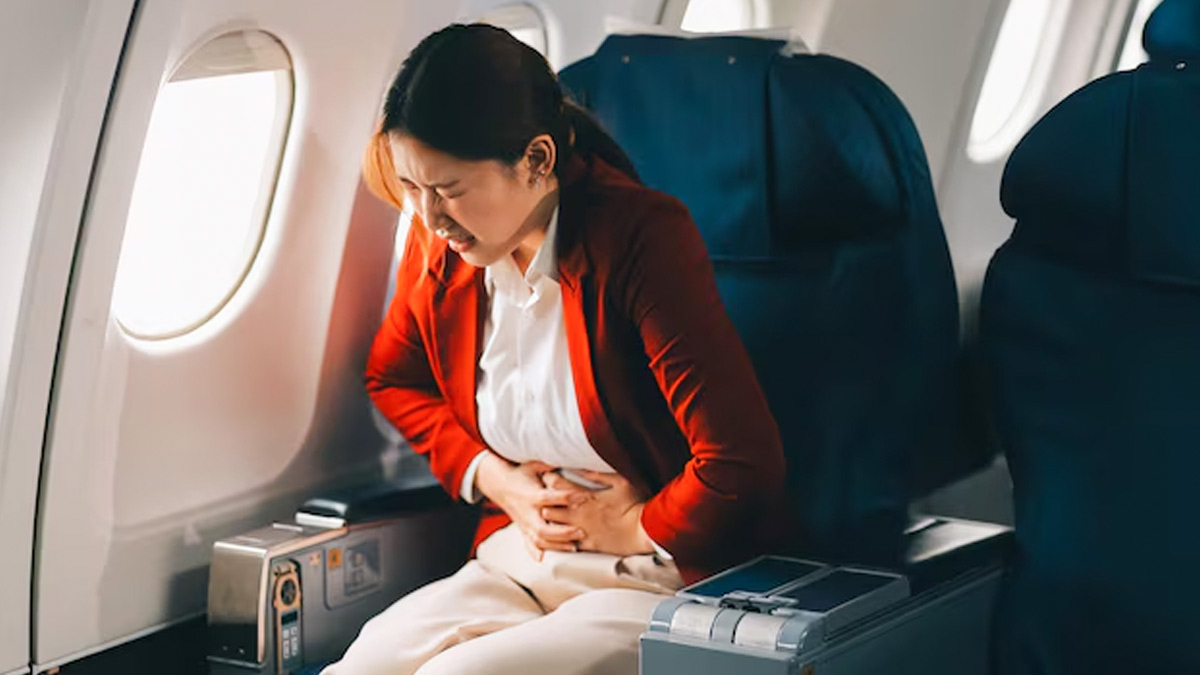
Travel is such a leisurely task. It is one of the most exciting aspects of our lives. But while excitement and anticipation fill our hearts, travel can indeed cause health issues, with constipation being a common problem. So, if you have had abdominal pain, bloating, difficulty passing hard stools, and a feeling of incomplete bowel evacuation, along with less frequent bowel movements than usual, then you're not alone. According to reports, almost 40% of travellers experience constipation during travel. But why does it really happen? The OnlyMyHealth team asked an expert.
Table of Content:-
Also Read: Can’t Poop While Travelling? Gastroenterologist Recommends Fruits to Relieve Constipation
Altered Routines And Changes In Time Zones

According to Dr Aditya Kulkarni, Consultant Paediatric Gastroenterologist and Hepatologist, Narayana Health SRCC Children’s Hospital, Mumbai, travel often affects the simple rhythm your gut relies on, as for many otherwise healthy people that translates into constipation.
Some of the key causes are altered routines due to the travel and/or changes in time zones. “Crossing time zones and altering routines confuse the body’s internal clock that helps regulate bowel function. The colon has daily patterns tied to sleep-wake cycles and regular mealtimes. So when those cues shift, the timing of bowel contractions changes,” he explains.
Additionally, jet lag can blunt the morning surge of activity after breakfast, so people who normally go daily may skip while travelling.
Diet And Dehydration

A 2024 cohort study published in Athenaeum Scientific Publishers followed 30 people who took a medium-haul flight and stayed abroad for a week. On average, travellers had their first bowel movement about six hours later than usual, with some waiting nearly two days. Those in the slowest group experienced the longest delays, up to almost two full days. While not everyone reported major digestive issues, some did struggle with bloating, pain, and discomfort that could dampen the joy of travel.
Travel constipation can also be triggered by unhealthy diet choices and dehydration. Dr Kulkarni shares that plane cabins and long drives are dehydrating environments. Dehydration occurs when your body loses more fluid than it takes in, preventing it from performing its normal functions. Therefore, less water intake makes stools firmer and harder to pass.
Travel diets, on the other hand, often mean more processed, low-fibre foods, quick snacks, heavy meals, or fewer fruits and vegetables, which reduce stool bulk and slow transit. Alcohol and caffeine can further dehydrate or disrupt sleep.
Sleep Disturbances, Stress, And Excitements
Sleep disturbances during travel, like jet lag, can trigger constipation, as disrupted sleep and circadian rhythms can affect bowel function.
A 2017 study published in the journal Medicine looked at how poor sleep affects people with chronic constipation. Among 126 patients, those with sleep problems had more severe constipation, higher anxiety and depression, and a poorer quality of life. While sleep issues were linked to worse health overall, they didn’t directly lower quality of life; instead, they did so indirectly by making constipation and mental health problems worse.
Stress and excitement that come before and during travel can also cause constipation. This is because they trigger the release of stress hormones like epinephrine and cortisol, which slow down intestinal movements.
Also Read: Travelling Abroad? Do THESE 7 Things To Steer Clear From Chikungunya Virus
How To Reduce The Risk Of Constipation While Travelling
-1757501164570.jpg)
Travel introduces several factors, such as altered diet, reduced fluid intake, disrupted sleep, reduced activity, stress, and jet lag, that can influence bowel habits. Dehydration, in particular, is common during air travel due to low cabin humidity and limited water consumption, while dietary changes, such as reduced fibre intake, eating unfamiliar foods, or relying on processed meals while abroad, may further slow gut motility.
Keeping all these factors in mind, here are some recommendations shared by Dr Kulkarni to reduce the risk of constipation during travel:
- Prioritise hydration by sipping water regularly and avoid long gaps.
- Keep some high-fibre snacks like dried fruit, nuts, and whole-grain crackers handy.
- Try to maintain a consistent wake and meal schedule where possible.
- Allow time in the morning after your main meal, as sitting quietly for a few minutes can help trigger the normal bowel reflex.
- Taking an osmotic laxative can provide gentle, effective, short-term relief while you restore fluids and fibre.
“Seek medical attention when constipation is severe, prolonged (more than 72 hours), accompanied by severe abdominal pain, persistent vomiting, fever, or blood in the stool, or if there is unexplained weight loss. For people with underlying conditions (neurologic disease, recent abdominal surgery, or inflammatory bowel disease) or those on constipating medications, earlier consultation is warranted,” advises Dr Kulkarni.
Conclusion
Constipation during travel is a common problem, triggered by factors such as altered routines, changes in dietary habits, sedentary activities, stress, excitement, and more. Moreover, dehydration is a common cause of constipation while travelling. Keeping all of these factors in mind is crucial, and if the symptoms of constipation persist, it is best to seek medical attention.
Also watch this video
How we keep this article up to date:
We work with experts and keep a close eye on the latest in health and wellness. Whenever there is a new research or helpful information, we update our articles with accurate and useful advice.
Current Version
Sep 15, 2025 15:53 IST
Published By : Tenzin Chodon